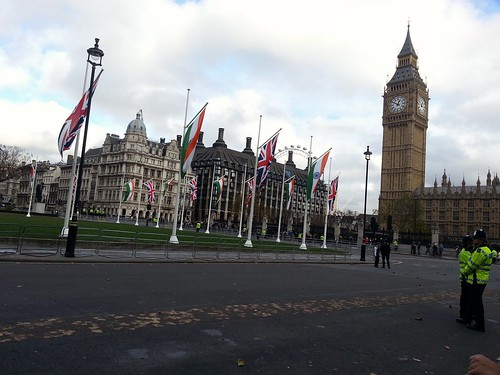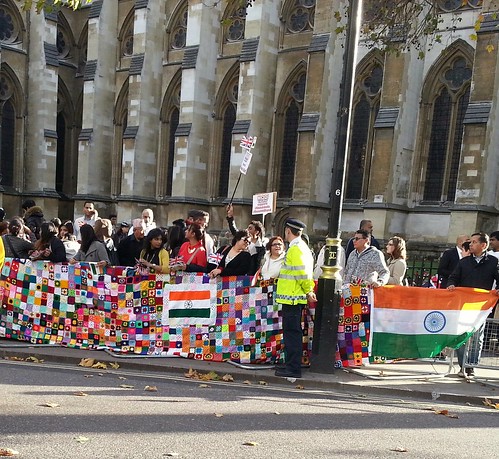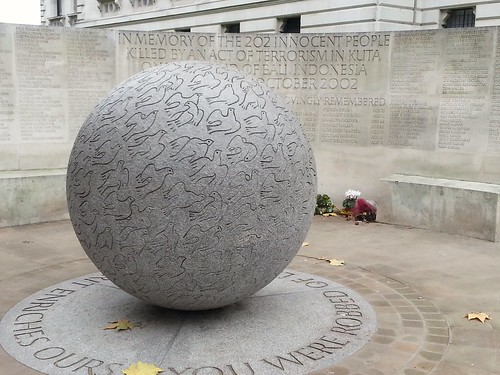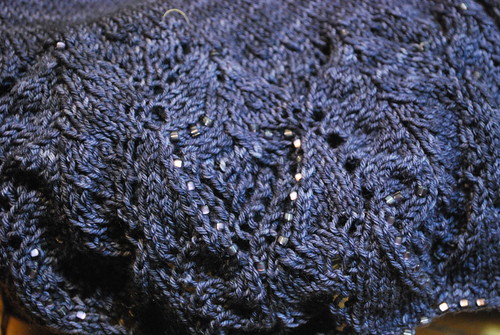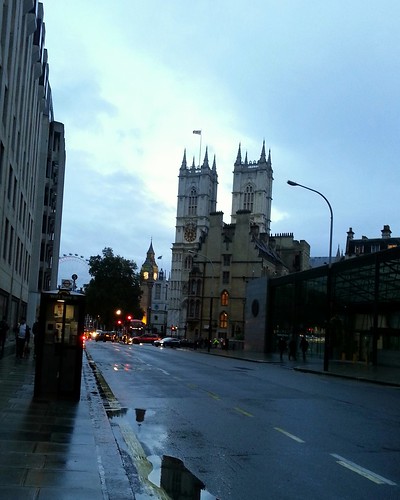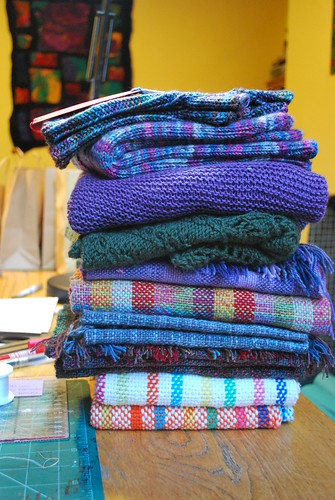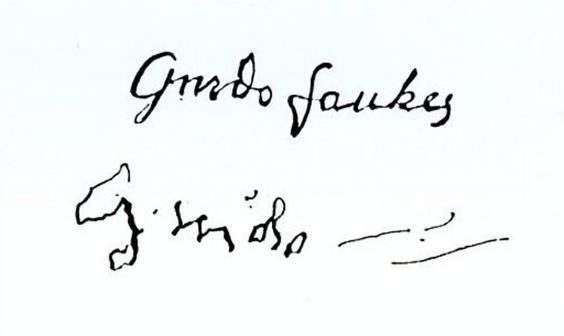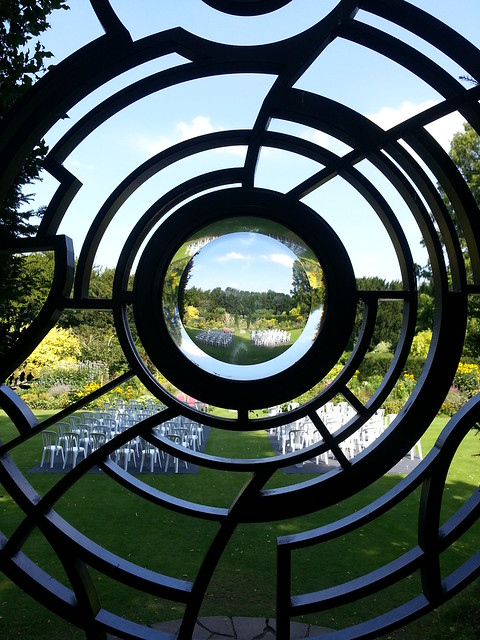2 x 2 houndstooth check on 7.5 dpi heddle; the yarn is Herriot Heathers from The Sheep Shop - 100% baby alpaca and feels like it!
Sunday, November 15, 2015
Interwoven
The scarf I finished on Friday night/Saturday morning while listening to the news from Paris on the radio. Destined for a Christmas present.
Saturday, November 14, 2015
Fun of the fair
To Festiwool at Hitchin. Given that I'd been up until after 3am listening to French radio, wandering around the house and ranting, I wasn't exactly the most awake I've ever been. But it was a lovely event, and good to meet some knitters and look at some beautiful things.
Here's the haul: Silk and baby camel from Travelknitter; Sokkosu O merino from Whimzy, which will become an ikat warp scarf, I hope; Nimbus (merino/silk/yak) from Sparkleduck in a colour Heather assured me would go well with the other two colours I have, and indeed does, beautifully. I picked up another couple of things but they were for gifts so not shown here...
Now off to dinner with friends in the village.
Here's the haul: Silk and baby camel from Travelknitter; Sokkosu O merino from Whimzy, which will become an ikat warp scarf, I hope; Nimbus (merino/silk/yak) from Sparkleduck in a colour Heather assured me would go well with the other two colours I have, and indeed does, beautifully. I picked up another couple of things but they were for gifts so not shown here...
Now off to dinner with friends in the village.
Friday, November 13, 2015
Not a night for blogging
I had an idea for a post tonight; but there are no words compared to what's going on in Paris.
Other than maybe, dear God, not again.
Other than maybe, dear God, not again.
Thursday, November 12, 2015
Visitors
If you've watched/listened to the news today, it won't have escaped your notice that the Indian prime minister is in town. And if you tried to get through the Westminster area, you'd have been sent off in all sorts of odd directions; all roads closed all day. This surprised my colleague and me; we needed to get to the building in the middle to retrieve our visitor, the guy delivering a training course to our colleagues, and take him to lunch. There wasn't nearly as much fuss when the Chinese premier came last month. But it was so wonderful how quiet the whole area was without traffic.
I gather there were protesters up on Whitehall, but we couldn't get up that far; on the way back, we did see the small welcoming committee, with their lovely crocheted banner, chatting away to the police on a warm, sunny afternoon.
I gather there were protesters up on Whitehall, but we couldn't get up that far; on the way back, we did see the small welcoming committee, with their lovely crocheted banner, chatting away to the police on a warm, sunny afternoon.
Wednesday, November 11, 2015
Remembrance
There has been so much overshadowing kerfuffle about the Cenotaph observations this year. I used to work about 100 yards from the Cenotaph and have generally posted something here about Remembrance Day, but this year even showing a picture of the Cenotaph might contravene my draconian non-partisan employment clause!
On the way from my new building to my old building, I pass this: the monument to the Bali bombings.
There are 202 doves; people of 21 nationalities were killed; and it stands as a powerful memorial.
Very obviously, we need to remember people who voluntarily, or under duress in time of war, put themselves in harm's way to serve their country. We should remember their bravery, and terror, and the sacrifice they made willingly or unwillingly. And we should also remember the "collateral damage"; most obviously military families and the civilians who can't get out of the way.
I remember realising, with a shock, that three guys having a kickabout on my village green a couple of years ago were each playing with one prosthetic leg. I remember a friend visiting the village at about the same time having a similar experience in the queue in the shop one evening when she bent down to pick up her bag and realised half the legs under the shorts of the fit young men in front of her were made of high-tech metal.
There are also the MSF medical staff killed while volunteering their services to save lives in appalling circumstances; and the people drinking in Birmingham pubs or dancing in the nightclubs of Bali, totally unaware they were part of someone else's war.
There are no more World War I veterans, and the number of living World War II veterans is dwindling rapidly; but we need a space to acknowledge the chaos wars continue to wreak in so many lives.
On the way from my new building to my old building, I pass this: the monument to the Bali bombings.
There are 202 doves; people of 21 nationalities were killed; and it stands as a powerful memorial.
Very obviously, we need to remember people who voluntarily, or under duress in time of war, put themselves in harm's way to serve their country. We should remember their bravery, and terror, and the sacrifice they made willingly or unwillingly. And we should also remember the "collateral damage"; most obviously military families and the civilians who can't get out of the way.
I remember realising, with a shock, that three guys having a kickabout on my village green a couple of years ago were each playing with one prosthetic leg. I remember a friend visiting the village at about the same time having a similar experience in the queue in the shop one evening when she bent down to pick up her bag and realised half the legs under the shorts of the fit young men in front of her were made of high-tech metal.
There are also the MSF medical staff killed while volunteering their services to save lives in appalling circumstances; and the people drinking in Birmingham pubs or dancing in the nightclubs of Bali, totally unaware they were part of someone else's war.
There are no more World War I veterans, and the number of living World War II veterans is dwindling rapidly; but we need a space to acknowledge the chaos wars continue to wreak in so many lives.
Tuesday, November 10, 2015
Hand-built
I'm loving the Great Pottery Throw-Down on BBC2 at the moment. Particularly the appreciation that this stuff takes time.
The art teaching I had at school was universally a bit rubbish in terms of inclusiveness. It was technique-driven, and if you couldn't do the technique, you were left behind. And "left behind" was definitely the right phrase in one year, where we spent the entire year learning watercolour, with a teacher who wasn't qualified in art teaching, who insisted that left-handers still lay a wash in the right-handed way; which meant we four left-handed kids were utterly scuppered to begin with because you had to lay the wash and paint over it in a certain order. (It's illustrative that I remember there were four of us. One in seven. One in seven kids who may as well not have turned up that year. It's given me an appreciation of difference. But I'd rather have learnt to use watercolours.)
I've always made things, and combined colours. But the first time I actually did this formally was at a pottery class. I made something or other in the basement of the Student Union (I think?) at Cambridge, and then some pots during my MSc at Loughborough; I still have one or two bits and bobs from the Loughborough club, and I think a couple of bowls may still be around with my ex-husband.
And then in the late 90s I went to a class at Cottenham with Debbie Cain, who had a completely different attitude to pots; you hand-built (there were wheels, too, but not enough for everyone; and there were lots of things you could do by hand-building); and there was a certain satisfaction in hand-building pots. Everything took a long time compared to Great Pottery Throw-Down - you only had 2 hours a week, you had the time unwrapping and wetting-down your pot, you had to take the tools out of the box again and wonder which scraper you used last time, you probably only had about an hour a week to do stuff, you queued for the kiln - but after a couple of months, you got something.
I have this 24cm high x 10-14cm diameter vase. I use it for stocks in spring, and sunflowers and chrysanths in autumn.
To all extents and purposes, it's rubbish. I built it over three sessions, and you can see that. It's massively lumpy. There are bubbles and really-not-correct textures in the glaze, and I didn't understand what the pale glazes were for, or what they did. The top flares out and for some reason I've textured the internal surface of the flare.
And I love it; and I'm proud of it.
By all standards of pottery, it's rubbish. When I take it down off the top of the kitchen cupboard to put flower in it, I smile.
God bless whoever thought of Great Pottery ThrowDown, and all who sail...
The art teaching I had at school was universally a bit rubbish in terms of inclusiveness. It was technique-driven, and if you couldn't do the technique, you were left behind. And "left behind" was definitely the right phrase in one year, where we spent the entire year learning watercolour, with a teacher who wasn't qualified in art teaching, who insisted that left-handers still lay a wash in the right-handed way; which meant we four left-handed kids were utterly scuppered to begin with because you had to lay the wash and paint over it in a certain order. (It's illustrative that I remember there were four of us. One in seven. One in seven kids who may as well not have turned up that year. It's given me an appreciation of difference. But I'd rather have learnt to use watercolours.)
I've always made things, and combined colours. But the first time I actually did this formally was at a pottery class. I made something or other in the basement of the Student Union (I think?) at Cambridge, and then some pots during my MSc at Loughborough; I still have one or two bits and bobs from the Loughborough club, and I think a couple of bowls may still be around with my ex-husband.
And then in the late 90s I went to a class at Cottenham with Debbie Cain, who had a completely different attitude to pots; you hand-built (there were wheels, too, but not enough for everyone; and there were lots of things you could do by hand-building); and there was a certain satisfaction in hand-building pots. Everything took a long time compared to Great Pottery Throw-Down - you only had 2 hours a week, you had the time unwrapping and wetting-down your pot, you had to take the tools out of the box again and wonder which scraper you used last time, you probably only had about an hour a week to do stuff, you queued for the kiln - but after a couple of months, you got something.
I have this 24cm high x 10-14cm diameter vase. I use it for stocks in spring, and sunflowers and chrysanths in autumn.
To all extents and purposes, it's rubbish. I built it over three sessions, and you can see that. It's massively lumpy. There are bubbles and really-not-correct textures in the glaze, and I didn't understand what the pale glazes were for, or what they did. The top flares out and for some reason I've textured the internal surface of the flare.
And I love it; and I'm proud of it.
By all standards of pottery, it's rubbish. When I take it down off the top of the kitchen cupboard to put flower in it, I smile.
God bless whoever thought of Great Pottery ThrowDown, and all who sail...
Monday, November 09, 2015
A little touch of Harry in the night
Just spent the evening at an excellent performance of Henry V at the Barbican. Had the pleasure of the company of Nic AKA Yarns from the Plain.
Has to be said, I wasn't totally convinced by Alex Hassell's Henry during the first half - he was edgier, less authoritative than I'd seen the part played before - but he showed Henry as a man who'd grown out of his wild days but was still very much a work in progress, and it worked extremely well. The other absolutely stand-out performance was from Oliver Ford Davies as the Chorus, appearing in his cardi and cords to apologise for the inadequacy of the play.
If you can get tickets, go.
Has to be said, I wasn't totally convinced by Alex Hassell's Henry during the first half - he was edgier, less authoritative than I'd seen the part played before - but he showed Henry as a man who'd grown out of his wild days but was still very much a work in progress, and it worked extremely well. The other absolutely stand-out performance was from Oliver Ford Davies as the Chorus, appearing in his cardi and cords to apologise for the inadequacy of the play.
If you can get tickets, go.
Sunday, November 08, 2015
View from the bus stop
Sometimes it's easy to get blasé about working in central London. Recently, I've been doing a mystery knitalong which is shaping up very nicely
From left, the London Eye, the Elizabeth Tower/Big Ben; St Margaret's Church, Westminster Abbey, Church House and the Business, Innovation and Skills Department...
Not bad, really!
and as it's London-themed, I've been taking the odd photo here and there to get people into the mood. Last month, I was waiting for a bus to take me to book group, and realised that my new bus stop (we moved offices in August) isn't at all in a bad location.
From left, the London Eye, the Elizabeth Tower/Big Ben; St Margaret's Church, Westminster Abbey, Church House and the Business, Innovation and Skills Department...
Not bad, really!
Saturday, November 07, 2015
2015 books, #61-65
A spool of blue thread, by Anne Tyler. London: Vintage, 2015.
Abby Whitshank always starts the story of how she and her husband Red fell in love with It was a beautiful breezy yellow-and-green afternoon... This is the story of four generations of Whitshanks and a house; and, increasingly, family secrets. I've been very bad at keeping up with my book reviews, and it's over a month since I read this book, so some of the details of plot have escaped me; but I'd unhesitatingly recommend it!
The monogram murders: the new Hercule Poirot mystery, by Sophie Hannah. London: Harper, 2015.
This was fun. I didn't read it when it came out because it got dreadful reviews; but a colleague whose opinion I trust on these things had enjoyed it. In this case, three bodies have been found in a London hotel, in their separate rooms, each with a monogrammed cufflink in the mouth. Poirot and his sidekick on this occasion, a newly-promoted Scotland Yard inspector, investigate. This amused and irritated me in equal measure, as all Hercule Poirot stories do; Poirot is as ever infuriatingly condescending to Inspector Catchpool and still going for the "collecting everyone in the library" school of dénouement; Hannah has done a fine job here and I think the plot is possibly somewhat more interesting than many of Christie's...
The cycling anthology. Volume 1. Edited by Ellis Bacon and Lionel Birnie. London: Yellow Jersey Press, 2014 [originally Peleton Publishing, 2012].
A fine collection of essays of various lengths on professional cycling, written by some of the best journalists in the business; Particular favourites are David Millar reflecting on his impending retirement and his rides with friend Michael Barry around Girona; the story of the Orica-GreenEDGE team; Kenny Pryde with an unusual take on drugs in cycling; and two views of Bradley Wiggins from William Fotheringham and Jeremy Whittle. I'm very glad there are another five of these volumes to get through!
Personal, by Lee Child [audiobook]. Read by Jeff Harding. Whitley Bay: Soundings, 2014.
Someone has taken a pot-shot at the French president, and that someone is obviously an expert sniper. Reacher, not a bad sniper himself, is called in to shortlist the candidates; and then to hunt down a man he'd already put in jail once. This one takes Reacher to Paris and to London; Child is at his best when introducing Reacher and his companion to British life, as an ex-pat Brit, and this canters along at a fine pace. It's amazing that this series hasn't really flagged in 19 books.
Face of the devil, by N J Cooper [audiobook]. Read by Julia Franklin. Whitley Bay: Soundings, 2011.
Teenager Suzie is found dead near her uncle's boat on the Isle of Wight; Olly Matkin, a schizophrenic schoolmate, is found covered in Suzie's blood, claiming he's killed her to take the devil out of her. Psychologist Karen Taylor and DCI Charlie Trench investigate. Did Olly really kill Suzie, and if so, was he put up to it by someone else? This is excellent, and the Isle of Wight setting is really interesting too. Julia Franklin is a good reader, if not wildly exciting.
Abby Whitshank always starts the story of how she and her husband Red fell in love with It was a beautiful breezy yellow-and-green afternoon... This is the story of four generations of Whitshanks and a house; and, increasingly, family secrets. I've been very bad at keeping up with my book reviews, and it's over a month since I read this book, so some of the details of plot have escaped me; but I'd unhesitatingly recommend it!
The monogram murders: the new Hercule Poirot mystery, by Sophie Hannah. London: Harper, 2015.
This was fun. I didn't read it when it came out because it got dreadful reviews; but a colleague whose opinion I trust on these things had enjoyed it. In this case, three bodies have been found in a London hotel, in their separate rooms, each with a monogrammed cufflink in the mouth. Poirot and his sidekick on this occasion, a newly-promoted Scotland Yard inspector, investigate. This amused and irritated me in equal measure, as all Hercule Poirot stories do; Poirot is as ever infuriatingly condescending to Inspector Catchpool and still going for the "collecting everyone in the library" school of dénouement; Hannah has done a fine job here and I think the plot is possibly somewhat more interesting than many of Christie's...
The cycling anthology. Volume 1. Edited by Ellis Bacon and Lionel Birnie. London: Yellow Jersey Press, 2014 [originally Peleton Publishing, 2012].
A fine collection of essays of various lengths on professional cycling, written by some of the best journalists in the business; Particular favourites are David Millar reflecting on his impending retirement and his rides with friend Michael Barry around Girona; the story of the Orica-GreenEDGE team; Kenny Pryde with an unusual take on drugs in cycling; and two views of Bradley Wiggins from William Fotheringham and Jeremy Whittle. I'm very glad there are another five of these volumes to get through!
Personal, by Lee Child [audiobook]. Read by Jeff Harding. Whitley Bay: Soundings, 2014.
Someone has taken a pot-shot at the French president, and that someone is obviously an expert sniper. Reacher, not a bad sniper himself, is called in to shortlist the candidates; and then to hunt down a man he'd already put in jail once. This one takes Reacher to Paris and to London; Child is at his best when introducing Reacher and his companion to British life, as an ex-pat Brit, and this canters along at a fine pace. It's amazing that this series hasn't really flagged in 19 books.
Face of the devil, by N J Cooper [audiobook]. Read by Julia Franklin. Whitley Bay: Soundings, 2011.
Teenager Suzie is found dead near her uncle's boat on the Isle of Wight; Olly Matkin, a schizophrenic schoolmate, is found covered in Suzie's blood, claiming he's killed her to take the devil out of her. Psychologist Karen Taylor and DCI Charlie Trench investigate. Did Olly really kill Suzie, and if so, was he put up to it by someone else? This is excellent, and the Isle of Wight setting is really interesting too. Julia Franklin is a good reader, if not wildly exciting.
Friday, November 06, 2015
It's beginning to look a lot like...
.... no, it's OK. I'm not going to say it.
But preparation for the End of Year Holiday is underway at casa Greenside. This is part of last year's production
and although I only have one child to knit for this year, I still have something of a heap of things to make. Not least because I have gently introduced my brother to the Way of the Hand-knit Sock, via making them for his wife who has toasty feet while he complains about his cold toes. Bwahahaha.
So, Friday nights this month, to give me an incentive for weekend production, here are thevotes from the Latvian jury figures. I include a semi-niece's birthday, and caughtknitting's birthday in the Christmas figures, and this year there's a baby due near Christmas (You Know Who You Are, pregnant lady!) ...
Total items 15
Kitted up 11
Started 10
Cast off or equivalent 6
Blocked/otherwise finished and labelled 5
Already with recipient 2
Let's see where we are next week.
Now, although it's only 8:45pm and I've only been in for an hour, I'm off to bed with knitting, books and my phone/Bluetooth speaker as I've just been told there's a Charles Paris I've missed on Radio 4. Bill Nighy, mmm.
But preparation for the End of Year Holiday is underway at casa Greenside. This is part of last year's production
and although I only have one child to knit for this year, I still have something of a heap of things to make. Not least because I have gently introduced my brother to the Way of the Hand-knit Sock, via making them for his wife who has toasty feet while he complains about his cold toes. Bwahahaha.
So, Friday nights this month, to give me an incentive for weekend production, here are the
Total items 15
Kitted up 11
Started 10
Cast off or equivalent 6
Blocked/otherwise finished and labelled 5
Already with recipient 2
Let's see where we are next week.
Now, although it's only 8:45pm and I've only been in for an hour, I'm off to bed with knitting, books and my phone/Bluetooth speaker as I've just been told there's a Charles Paris I've missed on Radio 4. Bill Nighy, mmm.
Thursday, November 05, 2015
Penny for the Guy
As November 5 rolls round, I suppose the thing that always strikes me is the image of the supposed signatures of Guy Fawkes both before and after torture...
Wednesday, November 04, 2015
Confluence
Confluence (n)
: a place where two rivers or streams join to become one
: a situation in which two things come together or happen at the same time
Soundtrack for this post*
: a place where two rivers or streams join to become one
: a situation in which two things come together or happen at the same time
Soundtrack for this post*
These photos are from Lyon, taken on 17 September this year. Since I was last in Lyon in May 2013, they've completed a mad and beautiful thing right at the tip of the peninsula which divides the Saône from the Rhone just before they flow together and sweep down towards the Mediterranean. It's part social housing, part world-class museum, part industrial park; it's a grand projet in the modern French tradition, and in a way we somehow fail to manage. Here's the view to the South through the confluence, taken from the top of the amazing new museum I hope to blog about later in the month. I am short, so you'll have to believe me that the line of posts marks the final coalescence of two of France's great rivers.
And here's the view to the North; more modern development to the right, 19th century development to left; the mediaeval centre is out of sight on the other side of the presqu'île.
When you go to Lyon and you're out of the tourist areas (stopping off for a glass of something after the triumphant conquest of a yarn shop, say...), people ask you what brings you to their city. And when you say "I'm here on holiday" they do a double-take. Lyon spends a fortune advertising itself as a destination; it's France's second city; it has wonderful history... But then, you could say the same thing in the UK context about Birmingham, and maybe people would react the same way.
Go to Lyon. It's gorgeous. And there's a direct Eurostar on the way there (don't get me started about UK customs and immigration on the way back!)
*Renaud is actually singing about teaching his daughter about penny chews and sherbert lemons here, but it felt like the right accompaniment.
Tuesday, November 03, 2015
Coming and going
One of the many reasons I don't blog much any more is because I spend nearly 4 hours of each weekday commuting. And while I love trains in general, sometimes they exasperate me beyond bearing. But the two London stations I see most often are really beautiful these days.
Here's the clock tower of St Pancras, seen through the uncovered and refurbished windows of King's Cross. A decade ago, those windows were covered in netting, absolutely filthy and mostly broken. A decade before that, St Pancras was a dilapidated shell, saved by John Betjeman and other campaigners in the 60s but a shadow of its former glory. Now both are thriving, living stations, the centre of a new complex which includes Central St Martin's School of Art. When I hear people getting on the "all modern life is rubbish" tack, I think of the restoration and development of this area and smile.
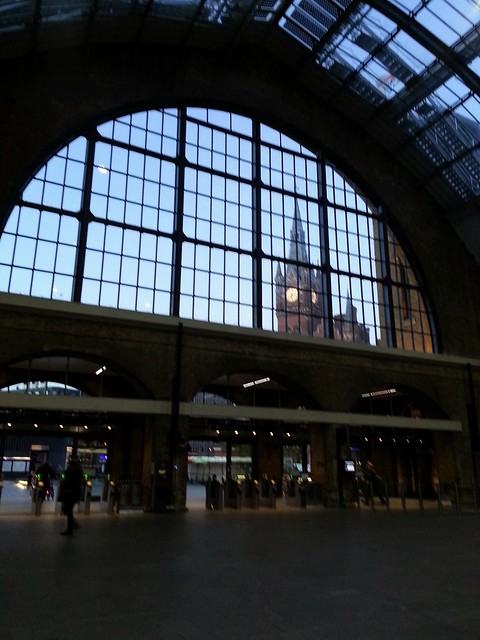
Here's the clock tower of St Pancras, seen through the uncovered and refurbished windows of King's Cross. A decade ago, those windows were covered in netting, absolutely filthy and mostly broken. A decade before that, St Pancras was a dilapidated shell, saved by John Betjeman and other campaigners in the 60s but a shadow of its former glory. Now both are thriving, living stations, the centre of a new complex which includes Central St Martin's School of Art. When I hear people getting on the "all modern life is rubbish" tack, I think of the restoration and development of this area and smile.

Monday, November 02, 2015
Vacillated
It's not very often that I knit something for myself - something that isn't a sweater, anyway. Usually, I'm knitting things to give away or as samples for classes these days. This Vacillate pattern, though, was something I saw and instantly wanted; and while I was trying to choose yarn, the Lava quarter from The Golden Skein arrived.
The red yarn in this skein is dyed by Travelknitter, the grey by Sparkleduck. Both are dyers I love, and both had a high silk content (Travelknitter's Tanami silk and baby camel, Sparkleduck's Pulsar silk and BFL). This was done as a knitalong (KAL) in the designer's group on Ravelry, and the deadline for posting photos was October 31. As ever, I only just made it!
I think this one's going to get a lot of wear this winter. The pattern is great - a simple chevron for most of the rows, with a bit of slip-stitching along the way - and it feels very Art Deco.
Sunday, November 01, 2015
It's that month again; let's have another go...
So, I'm trying this thing again.
This time round, I'm going to try to make things easier on myself by saying I'll just post a photo with a bit of a caption, and then if I get anything else written, that'll be great. But I'm aware that this blog has been all-but-moribund for a couple of years, other than book reviews (and thanks to everyone who has commented on those!), so anything's better than nothing, maybe?
My favourite photo of this year so far is one I took with my phone on the way to the university library one Saturday morning in July. I cut through my old college (Clare), and there was due to be a wedding in the gardens that day, so the beautiful new(ish) gate to the garden was closed. I loved the threefold reflection of the chairs through the lens in the gate, and the colours seemed so quintessentially English. All the very best to the couple who were married on that day.
Saturday, October 31, 2015
2015 books, #56-60
Longbourn, by Jo Baker. London: Transworld, 2013.
A book group book, and not one I was particularly looking forward to - yet again, I was pleasantly surprised. This is Pride and prejudice told from below stairs, and to my non-Austenite mind, the lack of concern the Bennets' servants pays to them does them credit. There are descriptions of the hard reality of early 19th century servanthood - the chilblains, the swill buckets, the emptying of the gazunders and all - but also a more sweeping, less confined view of the world than the gentry are allowed. We see the impact of the Napoleonic wars, and the ways the characters have made their money (I don't know whether the Bingleys did make their fortune in sugar plantations, but it leads to some interesting ideas); and there's a really rather wonderful and powerful love story in the middle of it all. Maybe two. I'd completely recommed this as a Good Read
Good as dead, by Mark Billingham [audiobook]. Read by the author. Oxford: Isis, 2011.
Tom Thorne is called in personally to help with a siege in a newspaper shop. The owner, a man whose son had killed himself in prison, has kidnapped Helen Weeks, a policewoman involved in family cases and another man; Tom has to investigate the son's death, the original case and also try to make sure that both hostages stay safe. I'm not doing a good job at describing this one, but it's another really good Mark Billingham plot and keeps the tension ramped up.
The ghost fields, by Elly Griffiths. London: Quercus, 2015.
A Ruth Galloway novel, and an excellent one. This time, Ruth is called in to look at bones found in a WWII aeroplane found in a field during building works. Weirdly, the body isn't decomposed in the way Ruth would expect - it seems to have been buried in different earth entirely. There's the usual cast of characters, with a return from Frank Barker whose TV company wants to make a documentary on the US involvement in WWII... and the introduction of the rather sinister Blackstock family. The plot takes you along, the relationships are complicated and interesting, but as ever, it's Ruth and her personality and observations which keep me reading.
"Ruth switches on Radio 4 for comfort but it's a dramatisation of Wuthering Heights, and after a few minutes of desolate moorland and doomed love, Ruth turns it off again. I cannot live without my life. I cannot live without my soul. That's all very well, Ruth tells Cathy, but sometimes you just have to."
The brutal telling, by Louise Penny [audiobook]. Read by Adam Sims. Oxford: Isis, 2009.
Gamache is back in Three Pines; this time, the body of a man has been found in the village bistro. Nobody seems to know who the stranger is, or where he's come from; but as the details appear, we seem to know even less about how he died, and why. Gamache is with Beauvoir and Lacoste, both of whom have troubles of their own; and we encounter old friends including mad poet Ruth Zardo and the continuingly odd Peter and Clara Morrow with their artistic rivalry. In the end, the revelation is genuinely shocking; while I've never considered this series belonging to the "cozy" category, I'm now sure that Penny is another of those authors like McDermid who's unafraid of the demolition of a well-loved character.
Silent voices, by Anne Cleeves [audiobook]. Read by Charlie Hardwick. Oxford: Isis, 2011.
Vera Stanhope is a very reluctant gym-user, but has been pressured into it by her GP. When she finds a woman's body in the steam room, she hopes she's just come across a natural death from over-exertion, but no such luck. Vera investigates with her usual vigour, trampling witnesses and colleagues in her path... This is a brilliant reading by Charlie Hardwick who's able to distinguish between a variety of North East accents.
A book group book, and not one I was particularly looking forward to - yet again, I was pleasantly surprised. This is Pride and prejudice told from below stairs, and to my non-Austenite mind, the lack of concern the Bennets' servants pays to them does them credit. There are descriptions of the hard reality of early 19th century servanthood - the chilblains, the swill buckets, the emptying of the gazunders and all - but also a more sweeping, less confined view of the world than the gentry are allowed. We see the impact of the Napoleonic wars, and the ways the characters have made their money (I don't know whether the Bingleys did make their fortune in sugar plantations, but it leads to some interesting ideas); and there's a really rather wonderful and powerful love story in the middle of it all. Maybe two. I'd completely recommed this as a Good Read
Good as dead, by Mark Billingham [audiobook]. Read by the author. Oxford: Isis, 2011.
Tom Thorne is called in personally to help with a siege in a newspaper shop. The owner, a man whose son had killed himself in prison, has kidnapped Helen Weeks, a policewoman involved in family cases and another man; Tom has to investigate the son's death, the original case and also try to make sure that both hostages stay safe. I'm not doing a good job at describing this one, but it's another really good Mark Billingham plot and keeps the tension ramped up.
The ghost fields, by Elly Griffiths. London: Quercus, 2015.
A Ruth Galloway novel, and an excellent one. This time, Ruth is called in to look at bones found in a WWII aeroplane found in a field during building works. Weirdly, the body isn't decomposed in the way Ruth would expect - it seems to have been buried in different earth entirely. There's the usual cast of characters, with a return from Frank Barker whose TV company wants to make a documentary on the US involvement in WWII... and the introduction of the rather sinister Blackstock family. The plot takes you along, the relationships are complicated and interesting, but as ever, it's Ruth and her personality and observations which keep me reading.
"Ruth switches on Radio 4 for comfort but it's a dramatisation of Wuthering Heights, and after a few minutes of desolate moorland and doomed love, Ruth turns it off again. I cannot live without my life. I cannot live without my soul. That's all very well, Ruth tells Cathy, but sometimes you just have to."
The brutal telling, by Louise Penny [audiobook]. Read by Adam Sims. Oxford: Isis, 2009.
Gamache is back in Three Pines; this time, the body of a man has been found in the village bistro. Nobody seems to know who the stranger is, or where he's come from; but as the details appear, we seem to know even less about how he died, and why. Gamache is with Beauvoir and Lacoste, both of whom have troubles of their own; and we encounter old friends including mad poet Ruth Zardo and the continuingly odd Peter and Clara Morrow with their artistic rivalry. In the end, the revelation is genuinely shocking; while I've never considered this series belonging to the "cozy" category, I'm now sure that Penny is another of those authors like McDermid who's unafraid of the demolition of a well-loved character.
Silent voices, by Anne Cleeves [audiobook]. Read by Charlie Hardwick. Oxford: Isis, 2011.
Vera Stanhope is a very reluctant gym-user, but has been pressured into it by her GP. When she finds a woman's body in the steam room, she hopes she's just come across a natural death from over-exertion, but no such luck. Vera investigates with her usual vigour, trampling witnesses and colleagues in her path... This is a brilliant reading by Charlie Hardwick who's able to distinguish between a variety of North East accents.
Saturday, September 05, 2015
2015 books, #51-55
How to speak money, by John Lanchester. London: Faber, 2015.
A book group book; and fascinating. Lanchester starts with a brief introduction to how he came to write this book, and some background on the financial system as it exists today; then the bulk of the book is an alphabetical dictionary of financial terms; and then he wraps up with some thoughts about the way he sees people's attitude to money changing in the present and the future. This could be an extremely dry read, but Lanchester has come at this book as a layman, and a funny, engaging layman at that. (And he does distinguish between BULLSHIT and NONSENSE quite early on...) Highly recommended. I'd quote some things, except that my copy's now at work as a quick reference for the next tricky financial term that comes along...
The bones beneath, by Mark Billingham. London: Sphere, 2015.
Absolutely gripping from start to finish. Stuart Nicklin, a serial killer Tom Thorne put behind bars a decade before, announces that there's another body to find on an isolated Welsh island; but he'll only tell the police where it is if Thorne accompanies him to the island, and another prisoner comes with him to ensure his safety. Thorne reluctantly agrees. Despite the accompanying police and prison officers, Thorne is uneasy about the scary, amoral Nicklin, and this concern only deepens as the weather on the island worsens. While this could be one of those classic "what's that noise outside; let's split up" stories, it's Billingham so it's way better than that. And there's a strange accompanying narrative which suddenly snaps into focus... in my case, too late... This is one I couldn't read at bedtime because the suspense was too much to be reading it in the dark!
Natural causes, by James Oswald. London: Penguin, 2013.
DI Anthony McLean has quite enough to deal with; he's been assigned an obviously old murder in the basement of a mansion, while trying to cope with the death of the grandmother who brought him up. Meanwhile, someone is killing old and influential men... The cases intertwine... I liked this because we really genuinely get to care about McLean's colleagues, and that's an essential as far as I'm concerned; and because there are a number of twists in the tail of this one. Oswald's definitely one to watch.
The woods, by Harlan Coben [audiobook]. Read by Carol Monda and David Chandler. Rearsby, Leics: WF Howes, 2008.
Twenty years ago, four teenagers at a summer camp walked into the woods and were never seen again. The brother of one of those teenagers is now the county prosecutor, and is taken to see the body of a recently-dead man who bears an uncanny resemblance to one of the missing. This is another great book by Harlan Coben, where nothing is as it seems and where the lead character doubts his sanity at various points. Really excellent stuff, and two very good readers.
The dying season, by Martin Walker. London: Quercus, 2015.
A Bruno, Chief of Police novel and another extremely good one. Bruno is attending a 90th birthday party for a war hero; the following day, one of the guests is found dead. While the man was a known alcoholic and ostensibly the death isn't suspicious, Bruno is wary of taking it at face value. Meanwhile, Bruno has his somewhat complicated relationship with Pamela, and the presence of hundreds of feral deer encouraged by a fervent but misguided écolo to deal with. Again, the food, the wine and the landscape of Périgord noir feature as characters in this book, and it's not one to read if you're at all peckish at the time!
A book group book; and fascinating. Lanchester starts with a brief introduction to how he came to write this book, and some background on the financial system as it exists today; then the bulk of the book is an alphabetical dictionary of financial terms; and then he wraps up with some thoughts about the way he sees people's attitude to money changing in the present and the future. This could be an extremely dry read, but Lanchester has come at this book as a layman, and a funny, engaging layman at that. (And he does distinguish between BULLSHIT and NONSENSE quite early on...) Highly recommended. I'd quote some things, except that my copy's now at work as a quick reference for the next tricky financial term that comes along...
The bones beneath, by Mark Billingham. London: Sphere, 2015.
Absolutely gripping from start to finish. Stuart Nicklin, a serial killer Tom Thorne put behind bars a decade before, announces that there's another body to find on an isolated Welsh island; but he'll only tell the police where it is if Thorne accompanies him to the island, and another prisoner comes with him to ensure his safety. Thorne reluctantly agrees. Despite the accompanying police and prison officers, Thorne is uneasy about the scary, amoral Nicklin, and this concern only deepens as the weather on the island worsens. While this could be one of those classic "what's that noise outside; let's split up" stories, it's Billingham so it's way better than that. And there's a strange accompanying narrative which suddenly snaps into focus... in my case, too late... This is one I couldn't read at bedtime because the suspense was too much to be reading it in the dark!
Natural causes, by James Oswald. London: Penguin, 2013.
DI Anthony McLean has quite enough to deal with; he's been assigned an obviously old murder in the basement of a mansion, while trying to cope with the death of the grandmother who brought him up. Meanwhile, someone is killing old and influential men... The cases intertwine... I liked this because we really genuinely get to care about McLean's colleagues, and that's an essential as far as I'm concerned; and because there are a number of twists in the tail of this one. Oswald's definitely one to watch.
The woods, by Harlan Coben [audiobook]. Read by Carol Monda and David Chandler. Rearsby, Leics: WF Howes, 2008.
Twenty years ago, four teenagers at a summer camp walked into the woods and were never seen again. The brother of one of those teenagers is now the county prosecutor, and is taken to see the body of a recently-dead man who bears an uncanny resemblance to one of the missing. This is another great book by Harlan Coben, where nothing is as it seems and where the lead character doubts his sanity at various points. Really excellent stuff, and two very good readers.
The dying season, by Martin Walker. London: Quercus, 2015.
A Bruno, Chief of Police novel and another extremely good one. Bruno is attending a 90th birthday party for a war hero; the following day, one of the guests is found dead. While the man was a known alcoholic and ostensibly the death isn't suspicious, Bruno is wary of taking it at face value. Meanwhile, Bruno has his somewhat complicated relationship with Pamela, and the presence of hundreds of feral deer encouraged by a fervent but misguided écolo to deal with. Again, the food, the wine and the landscape of Périgord noir feature as characters in this book, and it's not one to read if you're at all peckish at the time!
Wednesday, August 05, 2015
2015 books, #46-50
Bad blood, by Linda Fairstein [audiobook]. Read by Barbara Rosenblat. Rearsby, Leics.: Clipper Audio, 2007.
Another Alexandra Cooper book, and for me a curiously flat one. Cooper is prosecuting Brendan Quillan, a rich businessman who's accused of killing his wife. When Quillan's estranged brother is killed in a tunnelling accident, the focus of the investigation shifts and Cooper investigates. This one fills in a bit of detail about Cooper's later boyfriend (this is a rare series I'm not reading in order) but otherwise really didn't appeal to me; Rosenblat did the usual bang-up job with the reading, but I couldn't stop it just being background noise.
Common people: the history of an English family, by Alison Light. London: Fig Tree, 2014.
Weirdly, a colleague and I found we were reading this one at the same time. We then worked out we'd both heard about it via the BBC History Magazine... This is a strange book; Light looks at the history of her family, but uses it to mirror the history of England at the time. There's a huge amount of poverty and an unexpected amount of mobility (geographical and only occasionally social), and she takes us through the world of the workhouse, the mental hostpiral and the building trade as these affected her family in their time. I couldn't keep track of who all the people were, but it didn't seem to matter; it's a fascinating book which talks about profoundly ordinary people through the last couple of centuries.
Flowers stained with moonlight, by Catherine Shaw. London: Allison and Busby, 2005.
Another not-in-order series... Vanessa Duncan is a teacher in a Cambridge school for girls, but a notorious court case she was involved in four years before has brought her to the attention of a distraught mother. Mrs Bryce-Fortescue's daughter is accused of murdering her husband, an extremely wealthy landowner living near Haverhill. While Vanessa doesn't believe Sylvia committed the murder, she also doesn't believe Sylvia's story. Investigation of the case takes her to Paris (with her fiancé and two other mathematicians) and to Calais. I guessed what was going on quite quickly, although there was a twist I wasn't prepared for; and there's a fascinating real little episode in mathematical history built in (Catherine Shaw's alter ego is a professor of maths at Jussieu in Paris).
The truth about the Harry Quebert Affair, by Joël Dicker. Translated from the French by Sam Taylor. London; MacLehose Press, 2014.
This is a brilliant book. I wish I'd been able to sit down and devour it in one sitting, but it's a brick of a book so not one I could carry around. Young star-of-the-moment author Marcus Goodman has a mentor, Harry Quebert; when bones are unexpectedly dug up in Quebert's garden in 2008, Harry tells Marcus of a love affair he had with a 15-year-old girl, Nola Kellergan, in 1975. The bones are identified as Nola's, and Harry is arrested. Marcus is suffering from severe writer's block (that difficult second novel) and when his publisher gives him the alternative task of writing Harry's story, he takes it on both to save his skin and to try and prove Harry innocent. On the way, many secrets and lies are uncovered and there are some real switchbacks which make you re-examine everything which has gone before. It's also a book intertwined with ideas of fame, and the art of writing, and reputation; a tour de force. (Ironically, Dicker is now in the position Marcus was in at the beginning of the book.) The front cover says it's a Great American Novel in all but authorship, and I think this is probably true; there's a slight detachment from American life which is probably necessary, but it feels American in the way that an Edward Hopper painting does - there are gaps, and loneliness, and everyone has a story to tell.
Dust, by Patricia Cornwell [audiobook]. Read by Lorelei King. Rearsby, Leics.: Lamplight, 2013.
I shouldn't have started listening to this. I really shouldn't. But some of the recent Scarpetta books have been quite good. This, however, isn't one of them. Kay and her husband Benton (and every time she calls "Benton" I think of that bloke in the park, which really doesn't help) investigate a series of murders; while simultaneously trying to avoid Benton's evil boss. It goes along really pretty tediously for about 9 of the 11 discs in this set, and then I had to listen to disc 10 three times to work out what the hell was going on. The plot was OK (given that)... I think the thing which irritated me most was Cornwell/Scarpetta's inherent rush-to-judgment; always there but so much in this book. "It's a masculine space, lacking warmth or creativity" (WTF?)... and while I don't have the exact quote, there was a statement that the lack of pens/pencils/mugs on a desk was an exact correlative to a lack of hobbies and hinterland... And why use more frigid when you mean colder? Yes, I'm really grumpy. Lorelei King does her best with this one, but really... no.
Another Alexandra Cooper book, and for me a curiously flat one. Cooper is prosecuting Brendan Quillan, a rich businessman who's accused of killing his wife. When Quillan's estranged brother is killed in a tunnelling accident, the focus of the investigation shifts and Cooper investigates. This one fills in a bit of detail about Cooper's later boyfriend (this is a rare series I'm not reading in order) but otherwise really didn't appeal to me; Rosenblat did the usual bang-up job with the reading, but I couldn't stop it just being background noise.
Common people: the history of an English family, by Alison Light. London: Fig Tree, 2014.
Weirdly, a colleague and I found we were reading this one at the same time. We then worked out we'd both heard about it via the BBC History Magazine... This is a strange book; Light looks at the history of her family, but uses it to mirror the history of England at the time. There's a huge amount of poverty and an unexpected amount of mobility (geographical and only occasionally social), and she takes us through the world of the workhouse, the mental hostpiral and the building trade as these affected her family in their time. I couldn't keep track of who all the people were, but it didn't seem to matter; it's a fascinating book which talks about profoundly ordinary people through the last couple of centuries.
Flowers stained with moonlight, by Catherine Shaw. London: Allison and Busby, 2005.
Another not-in-order series... Vanessa Duncan is a teacher in a Cambridge school for girls, but a notorious court case she was involved in four years before has brought her to the attention of a distraught mother. Mrs Bryce-Fortescue's daughter is accused of murdering her husband, an extremely wealthy landowner living near Haverhill. While Vanessa doesn't believe Sylvia committed the murder, she also doesn't believe Sylvia's story. Investigation of the case takes her to Paris (with her fiancé and two other mathematicians) and to Calais. I guessed what was going on quite quickly, although there was a twist I wasn't prepared for; and there's a fascinating real little episode in mathematical history built in (Catherine Shaw's alter ego is a professor of maths at Jussieu in Paris).
The truth about the Harry Quebert Affair, by Joël Dicker. Translated from the French by Sam Taylor. London; MacLehose Press, 2014.
This is a brilliant book. I wish I'd been able to sit down and devour it in one sitting, but it's a brick of a book so not one I could carry around. Young star-of-the-moment author Marcus Goodman has a mentor, Harry Quebert; when bones are unexpectedly dug up in Quebert's garden in 2008, Harry tells Marcus of a love affair he had with a 15-year-old girl, Nola Kellergan, in 1975. The bones are identified as Nola's, and Harry is arrested. Marcus is suffering from severe writer's block (that difficult second novel) and when his publisher gives him the alternative task of writing Harry's story, he takes it on both to save his skin and to try and prove Harry innocent. On the way, many secrets and lies are uncovered and there are some real switchbacks which make you re-examine everything which has gone before. It's also a book intertwined with ideas of fame, and the art of writing, and reputation; a tour de force. (Ironically, Dicker is now in the position Marcus was in at the beginning of the book.) The front cover says it's a Great American Novel in all but authorship, and I think this is probably true; there's a slight detachment from American life which is probably necessary, but it feels American in the way that an Edward Hopper painting does - there are gaps, and loneliness, and everyone has a story to tell.
Dust, by Patricia Cornwell [audiobook]. Read by Lorelei King. Rearsby, Leics.: Lamplight, 2013.
I shouldn't have started listening to this. I really shouldn't. But some of the recent Scarpetta books have been quite good. This, however, isn't one of them. Kay and her husband Benton (and every time she calls "Benton" I think of that bloke in the park, which really doesn't help) investigate a series of murders; while simultaneously trying to avoid Benton's evil boss. It goes along really pretty tediously for about 9 of the 11 discs in this set, and then I had to listen to disc 10 three times to work out what the hell was going on. The plot was OK (given that)... I think the thing which irritated me most was Cornwell/Scarpetta's inherent rush-to-judgment; always there but so much in this book. "It's a masculine space, lacking warmth or creativity" (WTF?)... and while I don't have the exact quote, there was a statement that the lack of pens/pencils/mugs on a desk was an exact correlative to a lack of hobbies and hinterland... And why use more frigid when you mean colder? Yes, I'm really grumpy. Lorelei King does her best with this one, but really... no.
Saturday, July 04, 2015
2015 books, #41-45
Never go back, by Lee Child [audiobook]. Read by Jeff Harding. Whitley Bay: Soundings, 2013.
Jack Reacher finally makes it to Virginia to meet a woman whose voice he liked over the phone. When he arrives, not only is she absent, but he finds himself arrested by the military police for a 16-year-old assault, and is also under disciplinary proceedings for having fathered a child at about the same time. Reacher finds himself being summoned back under military discipline, and confronted with all the exasperation that being under a bad commander can bring. Absolutely up to the usual standard; and the Reacher/Susan Turner combination is a wonderful thing.
Dreaming spies, by Laurie R. King. London: Allison and Busby, 2015.
Mary Russell heads back to Oxford to study, and partly to give herself and husband Sherlock Holmes some space after a long voyage. What she finds on her doorstep when she comes back home one evening plunges her back into events on that voyage between Mumbai and Edo, and into the Japanese culture she and Holmes encountered there. The Russell books have sometimes been a little variable in quality, but this is one of the good ones, and highly recommended.
The Zig-zag girl, by Elly Griffiths [audiobook]. Read by Daniel Philpott. London: Quercus, 2014.
Not a Ruth Galloway book, this one - and set around Griffiths's home town of Brighton. Three veterans of a secret army unit are brought together by the murder of a magician's assistant, found chopped neatly into three in three trunks. Edgar Stephens, now a policeman, tracks down old comrade Max Mephisto, only to find that the victim is known to him. Stephens's theory that the murder has something to do with his, and Mephisto's, army experience is borne out by another murder, and it then becomes a fight against an unknown enemy, with a twist in the tail I'd guessed, but only just guessed... This appears to be the beginning of another series - I'd happily read about Stephens again.
Eddy Merckx: the cannibal, by Daniel Friebe. London: Ebury, 2012.
I learned a lot from this book - the climate of cycling in the 1970s, why Merckx was feared so much by his fellow riders because of his ferocious need to win in all circumstances, where he fits in with cycling history, and so on. But sadly I didn't learn to like the man. I wanted to - Friebe obviously does - but somehow I just couldn't take to him... An interesting, well-written read though!
Recipe for life: the autobiography, by Mary Berry [audiobook]. Read by Patricia Hodge. Rearsby, Leics.: WF Howes/Lamplight, 2013.
Another biography, but this time a bit more of a known quantity. Mary Berry doesn't confound expectations here - she has the blend of the highly conventional (she has strong opinions on nose-piercing, tight maternity wear and inappropriate dress) and the groundbreaking (working constantly from the early 1960s when finding a husband would have been perfectly acceptable to her family), and her wicked sense of humour shines through. She doesn't flinch from describing either her parents' bewilderment at her lack of academic achievement at school, or the death of her son William as a teenager in his first car. It's a story of constant reinvention. One of the things which stood out for me was also her generous praise for other cookery presenters and writers, particularly those like Jamie Oliver who have a completely different style. The reading by Patricia Hodge is predictably wonderful.
Jack Reacher finally makes it to Virginia to meet a woman whose voice he liked over the phone. When he arrives, not only is she absent, but he finds himself arrested by the military police for a 16-year-old assault, and is also under disciplinary proceedings for having fathered a child at about the same time. Reacher finds himself being summoned back under military discipline, and confronted with all the exasperation that being under a bad commander can bring. Absolutely up to the usual standard; and the Reacher/Susan Turner combination is a wonderful thing.
Dreaming spies, by Laurie R. King. London: Allison and Busby, 2015.
Mary Russell heads back to Oxford to study, and partly to give herself and husband Sherlock Holmes some space after a long voyage. What she finds on her doorstep when she comes back home one evening plunges her back into events on that voyage between Mumbai and Edo, and into the Japanese culture she and Holmes encountered there. The Russell books have sometimes been a little variable in quality, but this is one of the good ones, and highly recommended.
The Zig-zag girl, by Elly Griffiths [audiobook]. Read by Daniel Philpott. London: Quercus, 2014.
Not a Ruth Galloway book, this one - and set around Griffiths's home town of Brighton. Three veterans of a secret army unit are brought together by the murder of a magician's assistant, found chopped neatly into three in three trunks. Edgar Stephens, now a policeman, tracks down old comrade Max Mephisto, only to find that the victim is known to him. Stephens's theory that the murder has something to do with his, and Mephisto's, army experience is borne out by another murder, and it then becomes a fight against an unknown enemy, with a twist in the tail I'd guessed, but only just guessed... This appears to be the beginning of another series - I'd happily read about Stephens again.
Eddy Merckx: the cannibal, by Daniel Friebe. London: Ebury, 2012.
I learned a lot from this book - the climate of cycling in the 1970s, why Merckx was feared so much by his fellow riders because of his ferocious need to win in all circumstances, where he fits in with cycling history, and so on. But sadly I didn't learn to like the man. I wanted to - Friebe obviously does - but somehow I just couldn't take to him... An interesting, well-written read though!
Recipe for life: the autobiography, by Mary Berry [audiobook]. Read by Patricia Hodge. Rearsby, Leics.: WF Howes/Lamplight, 2013.
Another biography, but this time a bit more of a known quantity. Mary Berry doesn't confound expectations here - she has the blend of the highly conventional (she has strong opinions on nose-piercing, tight maternity wear and inappropriate dress) and the groundbreaking (working constantly from the early 1960s when finding a husband would have been perfectly acceptable to her family), and her wicked sense of humour shines through. She doesn't flinch from describing either her parents' bewilderment at her lack of academic achievement at school, or the death of her son William as a teenager in his first car. It's a story of constant reinvention. One of the things which stood out for me was also her generous praise for other cookery presenters and writers, particularly those like Jamie Oliver who have a completely different style. The reading by Patricia Hodge is predictably wonderful.
Tuesday, June 09, 2015
2015 books, #36-40
Exposed, by Liza Marklund [audiobook]. Read by India Fisher. Bath: AudioGo, [n.d.]
Annika Bengtzon is on a summer internship from her provincial newspaper, working at Sweden's largest tabloid newspaper. She's not initially impressed at being assigned to the tip-off line, but then has a call to say that a young woman's body has been found at a cemetery. Fiercely ambitious, Annika is not always an attractive character - she's prepared to use people for her own purposes - but the plot is gripping, involving senior politicians, nightclub strippers and rival newspapers. I did feel that the ending let it down somewhat, but I'd read another in this series. The main plot, it's explained, is an incident which happened to Marklund herself when she was a journalist; and India Fisher's reading is very good (I was somewhat worried when I realised she is the breathy voice of Masterchef, but she was considerably less mannered here!).
Put me back on my bike: in search of Tom Simpson, by William Fotheringham. London: Yellow Jersey, 2002.
A biography of Tom Simpson by someone who admires him, but is also concerned with drug-taking in sport; Simpson comes over as a tremendously attractive, flawed character and I really hadn't realised quite how famous he was in his time, as the first British cycling superstar. Fotheringham tells the story of Simpson's life and tragically early death, and also talks to medical experts and those who were around at the time about the use of amphetamines, alcohol and other substances in Simpson's time. It's an unvarnished account, but the respect for the man's achievement shines through both in the main narrative and in the interviews with those who were close to Simpson.
A slip of the keyboard: collected non-fiction, by Terry Pratchett [audiobook]. Read by Michael Fenton Stevens. Oxford: Isis, 2014.
Oh, Pterry; we miss you. And never as much while listening to the acerbic wit of the man talking about how to look after authors on tour; how not to piss off authors by sending them unsolicited manuscripts; how to become an author; what it's like writing for local newspapers and as a nuclear power station press officer... Tour diaries, articles for newspapers, introductions for SF Con programmes... it's all here. And then, towards the end, the fury and exploration after the Alzheimer's diagnosis, and the passionate belief in the right to decide on the manner and moment of one's death. I'm not sure you even need to have enjoyed anything by Terry Pratchett to enjoy reading this...
The absolutely true diary of a part-time Indian, by Sherman Alexie. London: Andersen Press, 2007.
This was my annual "challenged" book. The American Library Association puts out a list each year of the 10 books which have been subject to the most attempted bannings at libraries. This year, this was the top book so, as far as I was concerned, a must-read. Apparently unsuitable due to being "anti-family, cultural insensitivity, drugs/alcohol/smoking, gambling, offensive language, sex education, sexually explicit, unsuited for age group, violence. Additional reasons: “depictions of bullying”
So, obviously, I had high hopes of this one going in, and they weren't disappointed.
Arnold/Junior is an energetic, opinionated, bright narrator, with a huge determination to succeed. After a couple of terrible events, he decides that only enrolment at the local selective, white high school will get him out of his current situation in a Native American reservation. Unfortunately this alienates many of his previous friends while failing to win him new ones. This is a brilliant depiction of teenage life, lack of belonging, the beauty of realising how your family and community fit into the wider world... It's told with compassion and a huge amount of humour - it's a hilarious book - and I'm so glad the ALA brought it to my attention...
The library paradox, by Catherine Shaw. London: Allison and Busby, 2006.
Vanessa Weatherburn, married to Maths don Arthur and living peacefully in Cambridge with her children Cecily and Cedric in the late 1890s, has a penchant for private investigation. When she's asked by dons from London to investigate what is essentially a locked-room mystery, she can't resist. The investigation brings Vanessa into contact with the Hasidic community in North London, and the academic community based around King's College London. The dénouement is somewhat weak, but the colours and flavours, and the exposition of Victorian attitudes towards Judaism, is rather wonderful. And there's some Dreyfus Affair, which was about the only thing in late 19th century French history which really intrigued me.
Annika Bengtzon is on a summer internship from her provincial newspaper, working at Sweden's largest tabloid newspaper. She's not initially impressed at being assigned to the tip-off line, but then has a call to say that a young woman's body has been found at a cemetery. Fiercely ambitious, Annika is not always an attractive character - she's prepared to use people for her own purposes - but the plot is gripping, involving senior politicians, nightclub strippers and rival newspapers. I did feel that the ending let it down somewhat, but I'd read another in this series. The main plot, it's explained, is an incident which happened to Marklund herself when she was a journalist; and India Fisher's reading is very good (I was somewhat worried when I realised she is the breathy voice of Masterchef, but she was considerably less mannered here!).
Put me back on my bike: in search of Tom Simpson, by William Fotheringham. London: Yellow Jersey, 2002.
A biography of Tom Simpson by someone who admires him, but is also concerned with drug-taking in sport; Simpson comes over as a tremendously attractive, flawed character and I really hadn't realised quite how famous he was in his time, as the first British cycling superstar. Fotheringham tells the story of Simpson's life and tragically early death, and also talks to medical experts and those who were around at the time about the use of amphetamines, alcohol and other substances in Simpson's time. It's an unvarnished account, but the respect for the man's achievement shines through both in the main narrative and in the interviews with those who were close to Simpson.
A slip of the keyboard: collected non-fiction, by Terry Pratchett [audiobook]. Read by Michael Fenton Stevens. Oxford: Isis, 2014.
Oh, Pterry; we miss you. And never as much while listening to the acerbic wit of the man talking about how to look after authors on tour; how not to piss off authors by sending them unsolicited manuscripts; how to become an author; what it's like writing for local newspapers and as a nuclear power station press officer... Tour diaries, articles for newspapers, introductions for SF Con programmes... it's all here. And then, towards the end, the fury and exploration after the Alzheimer's diagnosis, and the passionate belief in the right to decide on the manner and moment of one's death. I'm not sure you even need to have enjoyed anything by Terry Pratchett to enjoy reading this...
The absolutely true diary of a part-time Indian, by Sherman Alexie. London: Andersen Press, 2007.
This was my annual "challenged" book. The American Library Association puts out a list each year of the 10 books which have been subject to the most attempted bannings at libraries. This year, this was the top book so, as far as I was concerned, a must-read. Apparently unsuitable due to being "anti-family, cultural insensitivity, drugs/alcohol/smoking, gambling, offensive language, sex education, sexually explicit, unsuited for age group, violence. Additional reasons: “depictions of bullying”
So, obviously, I had high hopes of this one going in, and they weren't disappointed.
Arnold/Junior is an energetic, opinionated, bright narrator, with a huge determination to succeed. After a couple of terrible events, he decides that only enrolment at the local selective, white high school will get him out of his current situation in a Native American reservation. Unfortunately this alienates many of his previous friends while failing to win him new ones. This is a brilliant depiction of teenage life, lack of belonging, the beauty of realising how your family and community fit into the wider world... It's told with compassion and a huge amount of humour - it's a hilarious book - and I'm so glad the ALA brought it to my attention...
The library paradox, by Catherine Shaw. London: Allison and Busby, 2006.
Vanessa Weatherburn, married to Maths don Arthur and living peacefully in Cambridge with her children Cecily and Cedric in the late 1890s, has a penchant for private investigation. When she's asked by dons from London to investigate what is essentially a locked-room mystery, she can't resist. The investigation brings Vanessa into contact with the Hasidic community in North London, and the academic community based around King's College London. The dénouement is somewhat weak, but the colours and flavours, and the exposition of Victorian attitudes towards Judaism, is rather wonderful. And there's some Dreyfus Affair, which was about the only thing in late 19th century French history which really intrigued me.
Subscribe to:
Posts (Atom)



